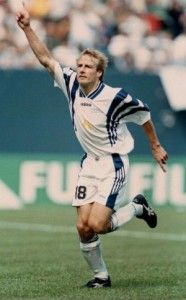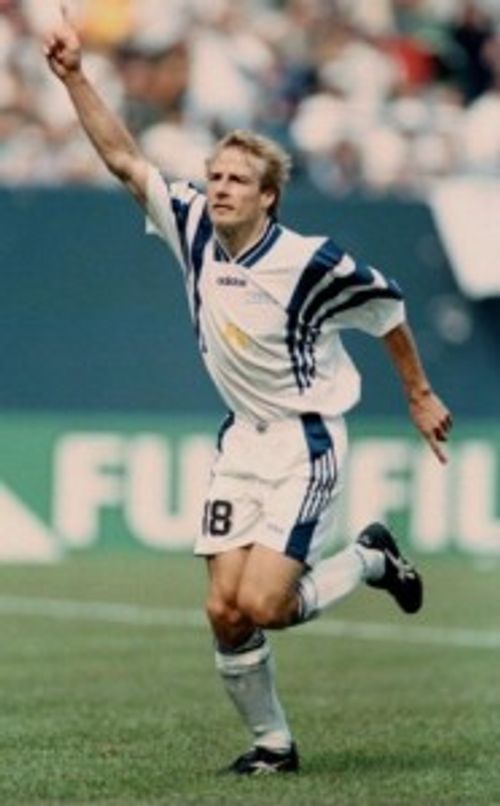
The greatest footballers of all time - No. 18
Continuing with our series on the greatest footballers of all time, here’s No. 18 on our list.
No. 18 – Jürgen Klinsmann

Jürgen Klinsmann has ‘been there and done that’ in every sense of the phrase. From playing in every position to winning the World Cup for Germany, Klinsmann has done it all. He scored in all the six major international tournaments he participated in. He partnered the great Rudi Völler. And now, he is even the coach of the United States national team.
Born in a baker’s house, Klinsmann was one of four sons, and was always expected to follow in his father’s footsteps. Football came easy to him though, and Klinsmann started young, representing TB Gingen, an amateur club in his hometown of Gingen an der Fils, by the age of eight. At TB Gingen, Klinsmann tried every position until finally, after scoring 16 goals in a single game, he settled in as a striker. Klinsmann signed up for the second division side Stuttgarter Kickers at the age of 16, and then turned professional in 1982. He was a regular starter for the side and scored 19 goals in the next season. His pace was a hot topic, since he was reported to have clocked 11 seconds on a 100m sprint.
By 1984, the ‘baker’s son from Botnang’, as he was affectionately called, shifted to VfB Stuttgart to make his first elite appearance in the Bundesliga. He kicked off his first season with 15 goals, but couldn’t prevent a tenth place finish for his side. He followed this with 16 goals in the next two seasons each and scored 19 goals in the 1987-88 season, when he was the top scorer in the Bundesliga. He also earned his first international appearance against Brazil in 1988 and was declared the German Footballer of the Year that year.
Come 1989 and Klinsmann moved to greener pastures in Italy, to join Inter Milan. Inter were set in their ways with a defensive mentality, but Klinsmann still managed to accumulate 13 goals. His proficiency in the Italian language won over the fans really quickly and he became a crowd favorite. He continued his free scoring with another 14 goals the following season and his contract was extended till 1994. But the 1992 season was a heavy setback for Inter, as they finished eighth in the league and Klinsmann scored just seven. He even lost his spot in the team sheet for a bit and that spelled the end of the line for him at the club.
On the international front, Klinsmann won a bronze in the Olympics of 1988. He was then selected for national duty in the 1990 World Cup in Italy. Germany had a series of tough clashes lined up at this event but they came through on every occasion. The Netherlands, England and finally, Argentina were taken apart one by one, as Germany took the prestigious Jules Rimet trophy home.
In 1992, Klinsmann moved to the French side AS Monaco, and helped them finish second with 19 goals. But the 1993-94 season was a disaster by Klinsmann’s standards, and the unwelcoming atmosphere around him made him leave the club earlier than dictated by his contract. He still managed to score 5 goals in the 1994 World Cup though, and won the German Footballer of the Year award again.
His move to England was a risky proposition, given the fact that he was persona non grata there, with Germany having kicked England out of the World Cup in 1990. He came to Tottenham for £2 million and scored 20 goals that year. His image took a turn for the better too, and Spurs sold over 150,000 shirts bearing his name, and he was even inducted into Madame Tussaud’s Wax Museum. He then shifted to German side Bayern Munich where he led from the front, being the club’s top scorer in both 1996 and 1997. He set a record by scoring 15 goals in 12 games during Bayern’s victorious UEFA Cup campaign. An unexplained move to the Italian side, Sampdoria, followed, but that ended prematurely, and he went back to the Spurs for his swansong, saving the club from certain relegation with 9 goals in 15 games.
Klinsmann decided to finally hang his boots and went on to take up the managing position for the German national side in 2004. His takeover signaled the revamp of the whole footballing system of the team after a disappointing Euro 2004 campaign, and offensive tactics were introduced to the German side. In the 2006 World Cup, Germany finished a respectable third, and that was the high point of Klinsmann’s career. In 2008, Klinsmann became Bayern Munich’s manager, leading the team to the quarters of the UEFA Champions League, where they lost to Barcelona. But with Bayern trailing by just 3 points at second place in the German league and with 5 games to go, differences between Klinsmann and the club’s Board of Directors paved the way for a separation. In July 2011, Klinsmann signed up to become the 35th coach of the United States Men’s national soccer team, replacing Bob Bradley, a position that he occupies till date.
Jürgen Klinsmann scored a total of 227 goals from 556 domestic appearances spread over four countries – Germany, Italy, France and England. He’s the third-highest capped player for Germany with 108 appearances and 47 international goals. His win percentage as a manager never dipped below the halfway mark and he’s also a renowned social worker with charities like ‘Agapedia’. He has scored at least three goals in three different World Cup campaigns, which is yet another feather in his cap.
A man of great prowess and a man with a heart, his attacking style made him a delight to watch, even though his managing ability was always undermined. Jürgen Klinsmann is easily one of the best players of this era and Germany can never forget his contribution, on or off the field.
And now, a video clip of Klinsmann’s greatest moments:
Here are the other players who have made it so far:
No. 20 – David Beckham
No. 19 – Oliver Kahn
Read the detailed write-ups on all the players in this list here:
The greatest footballers of all time